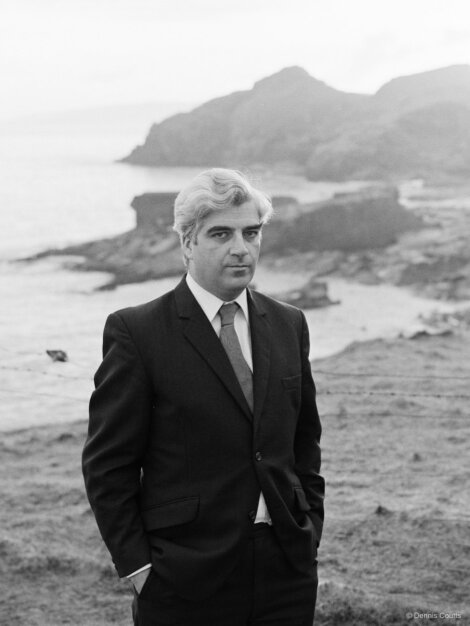Tributes / Ian Clark (1939 – 2024): the man who laid the foundations of Shetland as it is today
TRIBUTES have been paid to former Shetland Islands Council chief executive Ian Clark, who played a pivotal role in negotiating a fruitful deal with North Sea oil companies in the 1970s, after he passed away at the age of 85 earlier this year.
Speaking at the start of Wednesday’s full council meeting, SIC convener Andrea Manson warmly acknowledged the contribution of a man whose foresight – working alongside Northern Isles MP Jo Grimond and a group of shrewd serving councillors – did much to shape contemporary public life in the islands.
Born in 1939, Mr Clark grew up in Motherwell and trained to be an accountant before moving into local government, relocating to Shetland in the mid 1960s to become county treasurer and then county clerk and general manager for the then Zetland County Council (ZCC).
Following a local government reorganisation amid what was a turbulent political time in the early 1970s, he became the first ever chief executive of the newly-formed Shetland Islands Council.
Working with elected members including Edward Thomason, George Blance, John Jamieson and A.I. Tulloch, he took the far-sighted decision that Shetland would have to acquire special powers from parliament to give the local authority control and avoid a “free-for-all” with the oil business.
As [Labour politician and former energy minister] Brian Wilson noted in an obituary published nationally in July, following the discovery of abundant North Sea oil, Shetland faced the real possibility of oil multinationals swooping in to develop and operate their own terminals.
Much to the fury of some in the industry, Mr Clark was prepared to fight for and gain unprecedented powers for Shetland.
These included compulsory land purchases and additional planning controls, including the introduction of a works licensing regime for marine structures. He insisted on the creation of a single oil terminal at Sullom Voe, with the council as the harbour authority.
Become a member of Shetland News
Prior to that intervention, the ZCC had 150 staff and very little money, but today the SIC employs over 3,000 people, has a nine-figure annual budget, and possesses significant financial reserves.
Having rejected an early offer from Shell, Mr Clark went on to land a lucrative deal bringing millions of pounds a year Shetland’s way through a disturbance agreement, harbour dues and other payments. Today, interest generated from the invested funds supports both council and Shetland Charitable Trust (SCT) expenditure.
It is even thought that the classic movie Local Hero was in part based on Mr Clark’s ‘Goliath’ role in standing up to the oil giants. Indeed, archive documents from the 1970s suggest Mr Clark was regarded by some as more difficult to deal with than Libyan leader Colonel Muammar Gaddafi.
Oil-derived reserves held by SCT and the council, mostly invested on the world’s money markets, amount to well over £700 million today. Proceeds have also been used to create an enviable volume of infrastructure and public amenities, including a network of leisure centres and care homes dotted around Shetland, over the past half century.
Mr Clark was still only 37 when he left Shetland Islands Council in November 1976, and the passage of time means there are few around today who remember working with him directly.
County archivist Brian Smith met Mr Clark shortly after he arrived in the islands: “What interested me most about him were his strong religious and ethical views and his determination,” he says. “I am sure they are what spurred him on to take Shetland’s side in negotiation with the oil companies with such resolve.”
Alastair Hamilton recalls a council meeting attended by Mr Clark, just a few months before the chief executive’s departure, remembering him as a “quiet, patient man” whose achievements enabled him to speak with authority. “It’s not something you forget easily,” Hamilton says.
“It’s one of the few meetings I remember well from that time, because he already was such a significant figure. He had real presence and he was clearly listened to – people obviously valued his advice very much.”
Hamilton also had the pleasure of exchanging phone calls with Mr Clark as part of research he was conducting in the early 2020s, finding his sharp intellect undimmed, saying it was hugely enlightening to talk with someone whose influence “basically laid the foundations for Shetland as it is today”.
In their conversations, Mr Clark was keen to emphasise the role played by the National Ports Council, and in particular its Ayrshire-based representative, who offered advice and counsel in his efforts to strike a good deal for Shetland.
He also had high praise for Orkney and Shetland’s then MP, telling Hamilton that “I had great confidence that if I could carry Jo Grimond with me, I knew I was going to win (…) I had a great deal of admiration for him and a great deal of gratitude for the way he handled it.”
After leaving the islands Mr Clark, who was also a lay preacher, moved to the British National Oil Corporation – later privatised by Margaret Thatcher to become Britoil – and remained there until it was sold to BP in 1988.
He lived out his later years pursuing a diverse range of interests in Campbeltown, Argyll, gaining a PhD from the University of Wales Trinity Saint David in 2010 to add to an honorary doctorate bestowed by Glasgow University in 1979.
Mr Clark passed away on 17 June this year and is survived by his wife Jean, his son David and his daughter Susan, to whom Mrs Manson said the council “wishes to send its sincerest condolences”.
- Ian Robertson Clark, SIC chief executive and oil industry executive, born 18 January 1939; died 17 June 2024)
This obituary was compiled by Neil Riddell for Shetland Islands Council.
Become a member of Shetland News
Shetland News is asking its readers to consider paying for membership to get additional perks:
- Removal of third-party ads;
- Bookmark posts to read later;
- Exclusive curated weekly newsletter;
- Hide membership messages;
- Comments open for discussion.
If you appreciate what we do and feel strongly about impartial local journalism, then please become a member of Shetland News by either making a single payment, or setting up a monthly, quarterly or yearly subscription.




































































